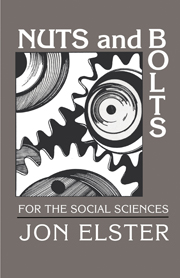XII - Social Norms
Published online by Cambridge University Press: 05 June 2012
Summary
RATIONAL action – be it economically or politically motivated – is concerned with outcomes. Rationality says, “If you want to achieve Y, do X.” Action guided by social norms is not outcome-oriented. The simplest social norms are of the type “Do X” or “Don't do X.” More complex norms have a conditional form: “If you do Y, then do X,” or “If others do Y, then do X.” An even more complex norm says, “If it would be good if all did X, then do X.” For such norms to be social, they must be shared by other people and partly sustained by their approval and disapproval. Typically, they are also sustained by the emotions that are triggered when they are violated: embarrassment, guilt and shame in the violator; anger and indignation in the observers. Frequently, a norm to do X is accompanied by a higher-level norm to punish those who violate the first-order norm, where the punishment can range from raised eyebrows to social ostracism.
This characterization of social norms is controversial, more so perhaps than most other arguments in this book. I shall discuss objections later, but first we need some illustrations of what I have in mind when I talk about social norms. I shall focus on the issue of whether social norms serve an ulterior purpose, that is, whether they are in some sense useful for the individual or for the society.
- Type
- Chapter
- Information
- Nuts and Bolts for the Social Sciences , pp. 113 - 123Publisher: Cambridge University PressPrint publication year: 1989
- 1
- Cited by



